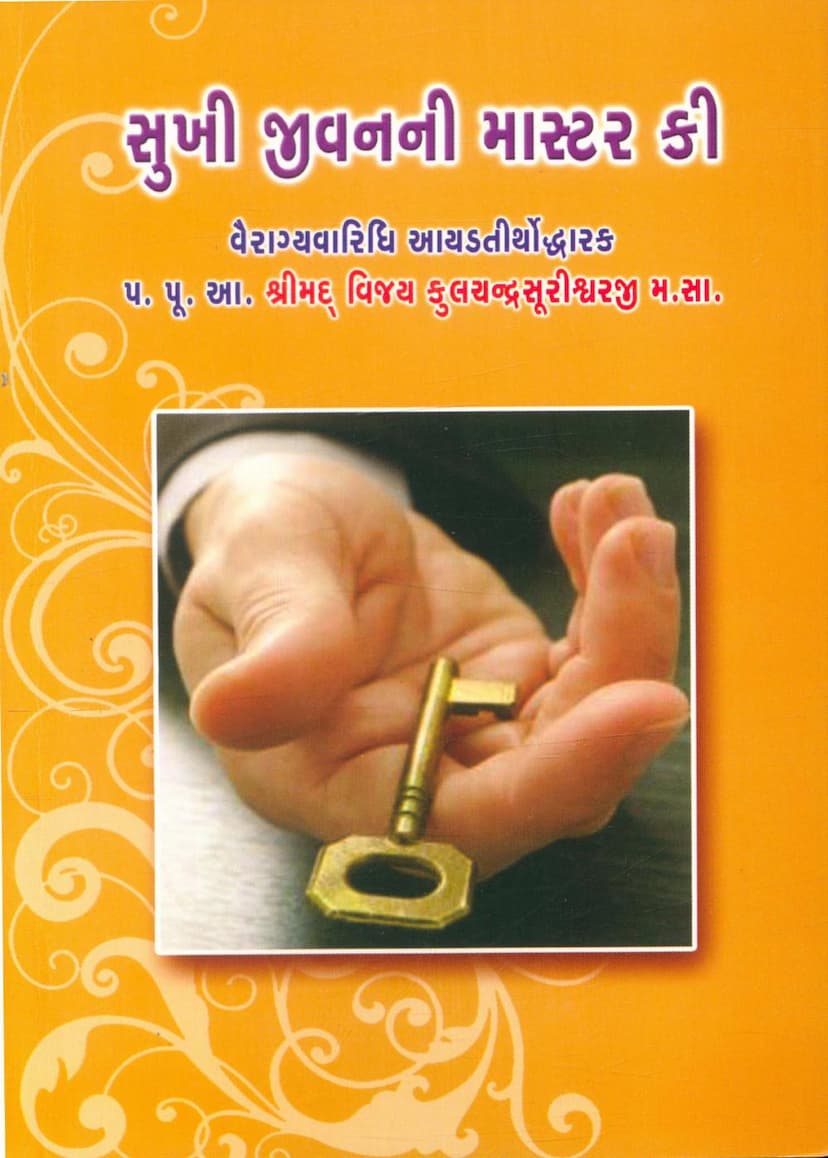Sukhi Jivanni Master Key
Added to library: September 2, 2025

Summary
"Sukhi Jivanni Master Key" (Master Key to a Happy Life) is a Jain text authored and inspired by Acharya Shri Vijay Kulchandrasurishwarji Maharaj. The book aims to provide guidance on how to live a happy and fulfilling life, drawing upon Jain principles and teachings.
The book is presented as a "master key" that can unlock the doors to a happy life for all beings. It emphasizes that while the key is provided, the individual must still put in the effort (purushartha) to read, contemplate, and implement the teachings.
The text outlines 35 virtues or qualities of a "Marganusari" (one who follows the path), which essentially refers to a householder who adheres to righteous conduct. These virtues are presented as essential for achieving success, respect, popularity, peace, fearlessness, and ultimately, the path to liberation (moksha).
The book then elaborates on many of these virtues, providing explanations and illustrative anecdotes or stories (prasangpat) to highlight their significance. Some of the key virtues discussed include:
- Naysampanna Vaibhav (Righteous Wealth): Earning wealth through honest and just means is crucial for both worldly well-being and spiritual progress. Unjust wealth is detrimental.
- Uchit Vivah (Appropriate Marriage): Marriage should be based on equality in lineage, character, wealth, and language. Proper conduct within marriage is also discussed.
- Shishtachar-Prashansa (Praise of Good Conduct): The importance of praising and emulating those with good qualities is highlighted.
- Antarshatru Vijay (Victory over Inner Enemies): This section focuses on conquering internal vices like anger, greed, ego, and attachment.
- Indriya Daman (Control of the Senses): The necessity of controlling one's senses and desires for pleasure is emphasized.
- Upadravwala Sthanono Tyag (Abandonment of Troublesome Places): Avoiding environments and situations that lead to trouble or moral compromise is advised.
- Uchit Ghar (Appropriate Home): Advice on choosing a suitable home and neighborly conduct is provided.
- Papbhiruta (Fear of Sin): Maintaining a fear of sin and its consequences is seen as a deterrent to wrongdoing.
- Ninda Tyag (Abandonment of Slander): The book stresses the importance of avoiding criticism and slander, particularly of respected individuals.
- Uchit Vyay (Appropriate Spending): Spending should be within one's means, with a focus on saving and judicious expenditure.
- Uchit Vesh (Appropriate Dress): Dressing according to one's status, age, and occasion is recommended.
- Mata-Pitaadi Poojan (Worship of Parents): Deep respect and service towards parents are considered a fundamental duty.
- Satsang (Good Company): The importance of associating with virtuous people and avoiding bad company is stressed.
- Krutagnata (Gratitude): Remembering and appreciating the help received from others is a vital virtue.
- Ajirna Abhojan (Not Eating When Indigested): The ill effects of eating when the previous meal is not digested are explained.
- Kale Mafak Bhojan (Eating at the Right Time): The significance of timely and appropriate eating habits is discussed.
- Daya (Compassion): Showing compassion to all living beings, including the needy and animals, is a core principle.
- Buddhi na Athgun Dharan Karva (Adopting the Eight Qualities of Intellect): This refers to the cultivation of intellectual virtues like listening, retention, contemplation, and discernment.
- Kadaagrah Tyag (Abandonment of Stubbornness): Refraining from rigid and unreasonable adherence to one's own opinions is advised.
- Vishesagyata (Expertise/Discernment): The ability to distinguish between right and wrong, good and bad, is crucial.
- Dev, Atithi ane Deen ni Puja, Satkar ane Seva (Worship, Hospitality, and Service to Gods, Guests, and the Needy): This highlights the duty to honor and serve divine beings, respected individuals, and those in need.
- Trivarg-Abadha (Balancing Dharma, Artha, and Kama): The book advises on the balanced pursuit of righteousness (Dharma), wealth (Artha), and pleasure (Kama) without neglecting any one aspect.
- Deshkal ne Uchit Charcha (Discussion Appropriate to Time and Place): The importance of speaking and acting according to the context and time is emphasized.
- Swa-Samarthya Aadi no Vichar Karvo (Considering One's Own Capabilities, etc.): It is essential to act within one's means and understanding.
- Lokpriyata (Popularity): Earning popularity through virtuous conduct and consideration for societal norms is discussed.
- Paropakarita (Altruism/Benevolence): Selfless acts of kindness and helping others are highly praised.
- Lajjashilta (Modesty/Shame): The virtue of shyness or a sense of shame about wrongdoings is presented as a protection against vices.
- Saumyatam (Gentleness/Kindness): Cultivating gentleness in speech and behavior leads to respect and pleasant relationships.
The book is structured into two parts, with the second part focusing on "Uchitacharana" (Appropriate Conduct) in relation to various individuals and roles:
- Pita Sambandhi (Regarding Father)
- Mata Sambandhi (Regarding Mother)
- Bhai Sambandhi (Regarding Brother)
- Stri Sambandhi (Regarding Wife/Woman)
- Putra (Putri) Sambandhi (Regarding Son/Daughter)
- Swajano (Saga-Sambandhio) Sambandhi (Regarding Relatives)
- Guru Sambandhi (Regarding Guru)
- Nagarik (Vyapari) Sambandhi (Regarding Citizen/Merchant)
- Anya Dharmi Sambandhi (Regarding People of Other Faiths)
Each of these sections provides specific guidelines and examples for proper conduct within these relationships, emphasizing respect, kindness, and mutual consideration.
The book concludes with sections on "Anuchit Acharano Tyag" (Abandonment of Inappropriate Conduct), "Samanya thi Hitoopadesh" (General Beneficial Advice), "Samanya thi Bhojan Vidhi" (General Rules of Eating), "Kushal Banvana Upay" (Ways to Become Proficient), and "Pashu-Pakshi thi Shikhava Malta Gun" (Virtues to Learn from Animals and Birds). These sections offer practical advice and ethical guidelines for daily life.
In essence, "Sukhi Jivanni Master Key" serves as a comprehensive guide to living a virtuous, happy, and spiritually progressive life, rooted in the teachings of Jainism. It emphasizes the practical application of ethical principles in personal relationships and societal interactions.